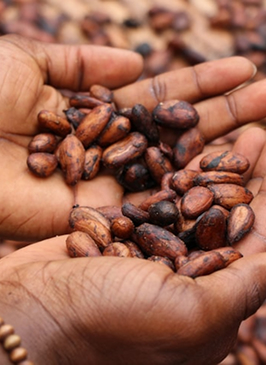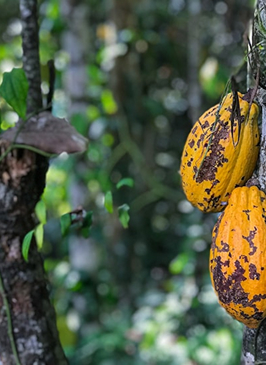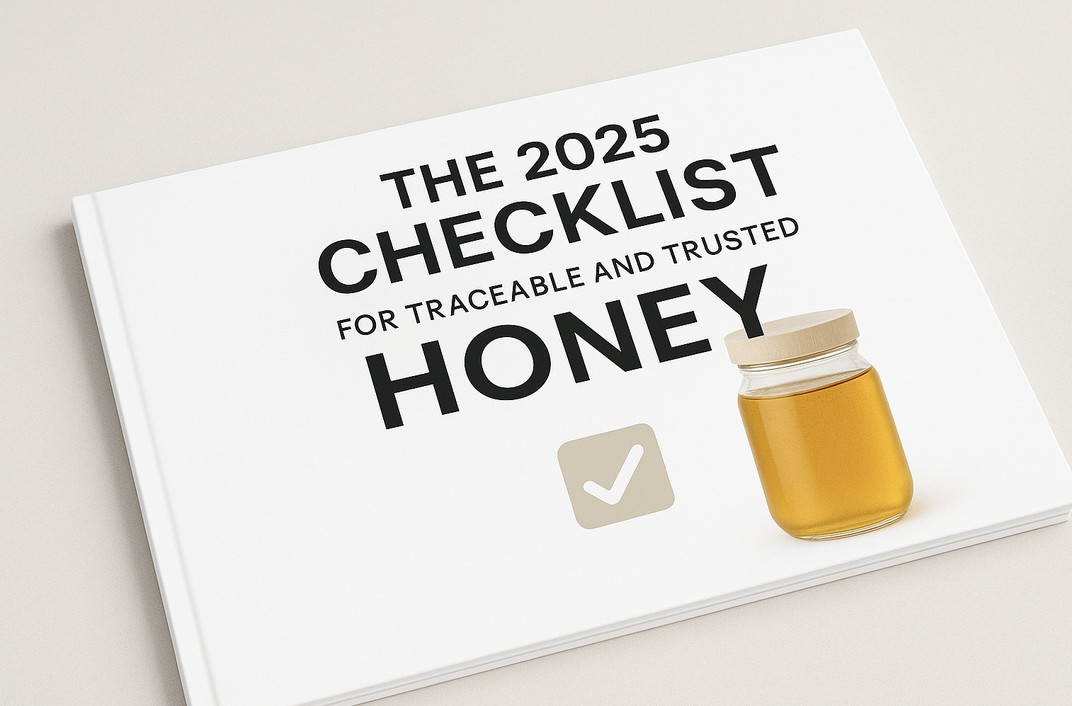A Closer Look
Cocoa Overview




Cocoa
Behind the Label: What Cocoa Really Tells Us
Cocoa isn’t just the foundation of chocolate — it’s a $12 billion global commodity that supports over 5 million smallholder farmers, mainly in West Africa (FAO, 2023). Yet behind its sweet exterior lies a bitter reality: widespread deforestation, child labor, and an opaque supply chain that hides more than it reveals.
The Problem: Deforestation, Labor Concerns, and Opaque Chains
A 2022 report by the World Cocoa Foundation found that over 70% of the world’s cocoa comes from Ghana and Côte d’Ivoire — two countries that have lost over 80% of their forests in the past 50 years (WCF, 2022). Much of this loss is linked to cocoa-driven deforestation.
In addition, the U.S. Department of Labor estimates that over 1.56 million children are involved in hazardous cocoa labor in West Africa (USDoL, 2020). Brands face growing pressure to prove their cocoa isn’t tied to environmental or human rights violations.
Despite growing certifications and ESG initiatives, many cocoa supply chains remain deeply opaque. Beans change hands multiple times before export, with little to no visibility into origin, practices, or compliance.

The Cost: Market Risk and Reputational Exposure
Without traceability, cocoa producers and buyers alike face mounting risks:
Producers struggle to access premium buyers or certifications.
Exporters and cooperatives face growing audit burdens.
Brands risk consumer backlash and non-compliance with new laws.
The EUDR regulation, which requires proof that cocoa was not grown on deforested land after 2020, is now mandatory for EU market access. Without credible traceability, large segments of the cocoa supply chain will be cut off from European buyers by 2025.

Boki LGA, Nigeria’s Untapped Cocoa Powerhouse
Boki Local Government Area (LGA) in Cross River State is home to one of Nigeria’s most promising cocoa-producing regions. Despite its rich soils and favorable climate, the region has been historically underutilized in global trade due to lack of infrastructure, market access, and digital tools.
Recent efforts are beginning to change that. With thousands of smallholder farmers growing cocoa in Boki’s rainforest-rich communities, the area is rapidly becoming a critical zone for sustainable cocoa sourcing in West Africa.
The Opportunity: Traceability for Inclusion and Transparency
Cocoa traceability enables:
Proof of deforestation-free origins using geolocation data
Verifiable farmer registration and training logs
Digital monitoring of harvest and supply volumes
These aren’t just compliance tools — they’re business enablers. When trust is visible, trade flows better.
As Dr. Kristy Leissle, author of Cocoa, puts it: “We cannot fix cocoa unless we see cocoa — not as a commodity, but as the people who grow it.”

What We’re Doing About It
Palmyra has partnered with West African cooperatives and local governments to bring traceability to the farm level. In Nigeria, we’ve joined forces with Boki LGA and Mangrove Foods to digitize cocoa supply chains and empower farmers with tools for compliance and visibility.
Through this collaboration, we:
Map farm boundaries in Boki using GPS and satellite data
Register and onboard cocoa farmers onto the Palmyra platform
Provide training on climate-smart and deforestation-free practices
Digitally log each cocoa batch from harvest to export
“This collaboration is about unlocking value for rural communities through smart partnerships. By enabling traceability and digital trade, we’re not just exporting cocoa—we’re exporting trust and quality.”
— Managing Director, Mangrove Agro-Allied Services Ltd
“Palmyra is proud to bring real-world digital infrastructure to Boki’s cocoa sector. Together, we’re enabling farmers and agents to participate fully in the global economy—on their own terms.”
— Theodore Morisis, Co-Founder, Palmyra
“Boki LGA is committed to making our cocoa industry a driver of prosperity and pride. This partnership reflects our dedication to innovation, transparency, and farmer empowerment.”
— Hon Eti-Eka Mrs Beatrice Etta Nyiam, Chairman, Boki Local Government Area

Traceability Isn’t About Tech — It’s About Trust
At its core, traceability is about recognizing the people behind the product — and ensuring they aren’t left behind.
If you’re a producer, buyer, or brand that believes cocoa deserves better, let’s connect.
The 2025 Checklist for Traceable and Trusted Cocoa


Sam Lambert
Co-Founder Palmyra®
From Olive Groves to Blockchain:
Greek Olive Oil Tokenization

Main Regions
Nigeria
Boki, Nigeria
Focus Areas
Traceability
Tokenization
Solutions
Palmyra Pro
Palmyra App